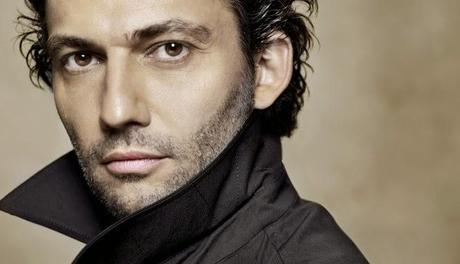by Paul J. Pelkonen

Take him to your Lieder: Jonas Kaufmann.
Photo © 2013 Sony Classical.
The lied, or German art song is vast genre, composed of little pieces that have the power to communicate a tremendous amount of information and emotion in a short, taut time-frame. For this concert, Mr. Kaufmann and accompanist Helmet Deutsch divided their attentions between the songs of Robert Schumann, Richard Wagner and Franz Liszt, using four groups of songs to create emotional power and narrative drive.
The evening opened with two sets of Schumann songs Mr. Kaufmann took the lead in the five selections from the Zwolfe Lieder, displaying the fine, powerful quality of his tenor in the fast opening "Lust der Sturmnacht" and the proto-Wagnerian chromaticism of "Frage." In "Stille Tränen", the voice opened up into a hint of its true power and shape, slicing cleanly over the piano and seeming to hover in the center of the hall some thirty feet beyond the lip of the stage. It is this trick of projection that makes a performance by this artist so compelling--the technique gives him instant communication and connection with his audience.
Schumann chose the sixteen songs that make up Dichterliebe carefully, arranging them so that they create a narrative flow and tell the story of a protagonist and his anguishes over lost love. Following in the model of the great Schubert song cycles, the tone darkens from innocence of early romance to rejection, delusion and finally death imagery in the last song. However, the emphasis shifts from the singer to the accompanist, who winds up telling the story even as the singer declaims text over the piano part. Schumann's rich melodic ideas sprang forth from this quiet accompanist's hands, given velvet voice by Mr. Kaufmann.
Highlights of these songs included the thrilling "Im Rhein, iim heiligen Strome," a portrait of the glories of Cologne Cathedral, and the sardonic "Ein Jüngling liebt ein Mädchen", played nimbly by Mr. Deutsch. The grim "Ich hab' im Traum geweinet" is stark, accompanied by bare-boned chords from the piano, its content reducing the packed hall to stunned silence. The finale, "Die alten, bösen Lieder" was bold and sardonic, with its dead-pan imagery of enormous coffins being lowered into the earth by gigantic sextons. However Mr. Kaufmann added tenderness to the final pages, emphasizing the bitter-sweet sentiment in this last song.
The Wesendonck Lieder were Richard Wagner's love-letter to Mathilde Wesendonck, the wife of his patron and the inspiration for the opera Tristan und Isolde. He set her texts while working on this opera, one of the few examples of the composer setting words by someone other than himself. These five songs (two of them, ("Im Treibhaus" and "Träume") contain material that later ended up in the second and third acts of Tristan) are usually sung by a soprano or mezzo. Mr. Kaufmann did not let such petty gender issues get in the way of him delivering a powerful performance of these songs, caressing the vocal line and rising up for the heroic moments in "Stehe still!" and "Schmerzen." Of all the songs, "Im Triebhaus" benefitted the most, with Mr. Kaufmann's dark-tinged singing a possible teaser for the Tristan that is undoubtedly in his future.
Mr. Kaufmann saved the real heroics for the last set of the evening: three Italian-text Sonatas di Petrarca by Franz Liszt. A challenge for the singer, these passionate declarations of love require a full, operatic style and push for the two big high notes in "Pace non trovo." Mr. Kaufmann displayed his head voice here, a soft, almost plaintive quality at odds with his normal full-voiced heroics. Those were present too in the last pages of "I' vidi in terra angelici costumi," sung with thrilling power.
However, the evening was not yet over. Mr. Kaufmann treated his enthusiastic audience to four lieder by Richard Strauss, pointing out that 2014 is that composer's anniversary year as he launched into "Freundliche Vision" and a thrilling "Cäcile." Following this, he knelt humbly before the adoring, applauding audience before bringing Mr. Deutsch back for two last songs: Robert Schumann's gorgeous, ethereal "Mondnacht" and finally an opera excerpt: "Gern hab ich die Frau’n geküβt" from the Lehar operetta Paganini. Like that other virtuoso that inspired the Lehar work, this was a performance that drew unbridled enthusiasm from the assembled. Orpheus had triumphed.

